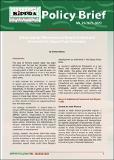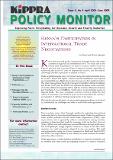Policy Brief No. 25 of 2022-2023 on Enhancing the Effectiveness of Kenya’s Institutional Framework for Export Trade Promotion
| dc.date.accessioned | 2023-01-12T07:26:52Z | |
| dc.date.available | 2023-01-12T07:26:52Z | |
| dc.date.issued | 2022 | |
| dc.identifier.uri | https://repository.kippra.or.ke/handle/123456789/4031 | |
| dc.description.abstract | The size of Kenya’s export trade has been shrinking over the last two decades. Despite the country’s exports of goods and services averaging 20% of GDP in the last 20 years, the average share has fallen to 17.2% in the last 10 years before further shrinking to 13.9% in the last 5 years.A country’s institutional framework is a key factor that influences performance of the trade sector. This policy brief examines how Kenya’s institutional framework could support expansion of the country’s trade sector for faster development. Focus is accorded to the role access to trade finance, court system, tax inspections and associated bribes, operating licenses and permits, on-the-job training of employees, quality certification, competition from informal enterprises, and customs and trade regulations play in promoting export trade. | en |
| dc.language.iso | en | en |
| dc.publisher | Kenya Institute for Public Policy Research and Analysis (KIPPRA) | en |
| dc.relation.ispartofseries | PB/25/2022-2023 | |
| dc.subject | Institutional Framework | en |
| dc.subject | Export Trade | en |
| dc.subject | Export Trade Promotion | en |
| dc.subject | Quality Certification | en |
| dc.subject | Tax Inspections | en |
| dc.title | Policy Brief No. 25 of 2022-2023 on Enhancing the Effectiveness of Kenya’s Institutional Framework for Export Trade Promotion | en |
| dc.type | KIPPRA Publications | en |
| ppr.contributor.author | Mwatu, Shadrack | en |
Files in this item
This item appears in the following Collection(s)
-
Policy Briefs [167]




